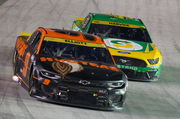
via Getty
MARTINSVILLE, VIRGINIA – OCTOBER 30: John H. Nemechek, driver of the #4 Pye-Barker Fire & Safety Toyota,leads the field during the NASCAR Camping World Truck Series United Rentals 200 at Martinsville Speedway on October 30, 2021 in Martinsville, Virginia. (Photo by Brian Lawdermilk/Getty Images)

via Getty
MARTINSVILLE, VIRGINIA – OCTOBER 30: John H. Nemechek, driver of the #4 Pye-Barker Fire & Safety Toyota,leads the field during the NASCAR Camping World Truck Series United Rentals 200 at Martinsville Speedway on October 30, 2021 in Martinsville, Virginia. (Photo by Brian Lawdermilk/Getty Images)
Over the past few years, NASCAR has been under the microscope. The sport has long been known for its high-octane action, loyal fanbase, and ever-evolving strategy. But recently, there’s been a growing buzz about NASCAR’s changing policies—especially as they trickle down to its lower divisions, like the Xfinity Series and Truck Series. A key theme that keeps cropping up is the notion of cost-cutting and the increasing centralization of power within the sport. And while this may sound like a good thing in theory, many team owners are starting to get concerned.
The latest firestorm began with NASCAR announcing changes to its lower divisions for the 2024 season. The sanctioning body rolled out new rules around fire suits for teams in the Truck Series. These suits, which had long served as a valuable advertising space for teams, would now face new design restrictions to cut costs and meet safety regulations. Thus, it raises more concerns among the lower division teams. NASCAR president Steve Phelps has hinted at possible major changes in the pipeline for their cars.
ADVERTISEMENT
Article continues below this ad
What changes is NASCAR planning to bring?
Let’s take a step back and look at the broader picture. NASCAR introduced its Next-Gen car to the Cup Series in 2022, marking a major shift in the sports landscape. The new car was designed to lower costs, improve safety, and create a more competitive racing environment. It was a bold move, but it’s also been somewhat controversial, with mixed reviews from teams, drivers, and fans alike. On the one hand, the Next Gen car has brought much-needed modernization to the sport. On the other hand, it has come with a price tag that has caused financial strain for some teams, especially smaller ones, and backmarker teams.
Now, NASCAR looks to carry elements of the Next Gen car and apply them to the Xfinity and Truck Series. During a recent interview at Race Industry Week, Steve Phelps teased this idea of suggesting changes could come to the lower divisions in the near future.
Phelps stated, “You know I think there are some other opportunities for us in the lower series to make some changes what those look like I don’t know, but we’ll keep iterating on the next-gen car. I think we’re looking at some things in the Xfinity series nothing to announce now. I think there’s something we need to do with our race teams in the Xfinity series as well as the manufacturers that are existing and potential new OEs that could be in that series and in our Truck Series. Any changes to the Xfinity Series or Craftsman Truck Series would need to be supported by those in that garage for them to continue racing as well.” He further mentioned potential changes to both the Xfinity and Truck Series, though he didn’t provide specifics.
But why is NASCAR wanting to do this?
The Xfinity races were probably the most exciting we saw in the entire season. NASCAR analyst Eric Estepp dwelled on this saying, “Phelps’s comments last week.. said he’s bullish believes a new manufacturer will join NASCAR. Honda recently put public pressure on IndyCar to evolve change their business model or they could pull out in the coming years. NASCAR likely is feeling similar pressure from Ford, Chevy, and Toyota. They’re hearing similar things from Honda and other prospective manufacturers. What do they want to see in NASCAR for them to be willing to make that major investment? NASCAR has to continue to evolve stay up to date that’s the door that I believe Steve Phelps is attempting to slowly push open with those comments.”
However, the idea of a “Next Gen” evolution for the lower divisions has raised serious concerns. If the same cost-increasing elements are introduced into the Truck and Xfinity Series, many team owners are worried that they will be priced out of the sport. These teams, particularly those operating on tighter budgets, may struggle to adapt to higher costs—especially if those changes require them to invest in expensive spec parts or redesign their entire fleet of racecars.
Team owners like Tommy Joe Martins, co-owner of Alpha Prime Racing in the Xfinity Series, have voiced their concerns loudly. Martins tweeted his frustration with the idea of how the Next Gen model is being phased into the lower divisions, explaining that the car platform would be “extremely cost prohibitive” for most Xfinity teams. “NASCAR knows there would have to be a lot of changes/removals to the platform. Even then, most teams still couldn’t afford it, plus every car part we own is trash,” Martins said.
This would be a longgg runway that’s only been discussed in one on ones. The next-gen is extremely cost prohibitive to Xfin owners & NASCAR knows there’d have to be a LOT of changes/removals to the platform. Then most teams still couldn’t afford it + every car/part we own is 🗑️
— Tommy Joe Martins (@TommyJoeMartins) December 8, 2024
If you’re following along, Martins seems to suggest how NASCAR may require teams in the lower divisions to adopt certain spec parts or in the worst case, transition to a fully spec car platform similar to what we see in the Cup Series. If that were to happen, the concern is the cost burden would fall disproportionately on smaller teams, pushing them further to the margins and possibly forcing them to exit.
Estepp further mentioned, “I’m right there with you. The current Xfinity Series car platform produces some of the best racing in the world in my opinion. I understand needing to get costs under control, but any change that makes it harder for 15th to 25th place teams like Alpha Prime racing, like a Jeremy Clemens racing like a DGM. Any change that makes it harder for these midsize teams to contend to compete is a change I hope stays in the drafts.”
But that’s not all. The broader issue at hand is the centralization of power within NASCAR, which comes with the next-gen car.
Trending
ADVERTISEMENT
Article continues below this ad
Is this another one of NASCAR’s monopolistic moves?
The sport has had a mix of manufacturers and suppliers competing to provide parts and technologies for the teams for years. However, with the introduction of the Next Gen car, NASCAR has consolidated many supply chains under single-source contracts. This has created a lack of competition for parts, which drives up prices and limits the teams’ flexibility. This is also one reason Michael Jordan owned 23XI Racing and Front Row Motorsports are fighting a lawsuit against NASCAR.
The teams in their antitrust lawsuit discussed how Cup teams have to buy parts from NASCAR-approved vendors only. While Cup teams can afford that, lower divisions, especially backmarker teams, don’t have the capital required to buy parts at any price the vendor would demand.
Even Estepp agreed this could be a problem. “I think about how much of the most recent Cup Series Charter negotiations centered around the Next-Gen car, how expensive these single-sourced parts have become. How the fact that NASCAR has chosen many of these vendors, how there’s no natural competition for these parts, how that’s potentially driven up the price, how there’s a conflict of interest there.”
ADVERTISEMENT
Article continues below this ad
So if NASCAR plans to do the same in the lower leagues, is that justified? Share your thoughts on this in the comments below.
ADVERTISEMENT
ADVERTISEMENT
ADVERTISEMENT
ADVERTISEMENT







